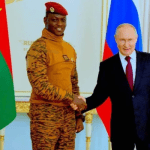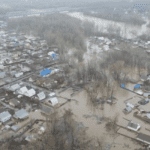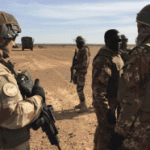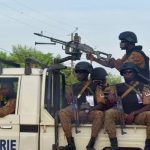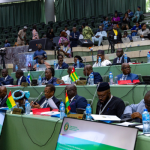Russia has reopened its mission in Burkina Faso, which it had shuttered in 1992, continuing a rapprochement with this Sahelian country run by a military dictatorship that has sought to diversify its relations since its break with France last year.
The Russian ambassador to Côte d’Ivoire accredited to Burkina Faso, Alexeï Saltykov, who until now resided in Abidjan but who has made regular trips to Ouagadougou in recent months, added that he would initially lead the diplomatic mission in Burkina until the appointment of an ambassador by Russian President Vladimir Putin.
The Burkinabè Prime Minister, Appolinaire Joachimson Kyélèm de Tambéla, the Burkinabè Minister of Foreign Affairs, Karamoko Jean-Marie Traoré, other members of the government and the chief of general staff of the armies in Burkina were present during the ceremony.
The Burkina Faso embassy in Russia was reopened in 2013, after closing in 1996.
For his part, the head of Burkinabe diplomacy, Karamoko Jean-Marie Traoré, assured during the ceremony that the closure of the Russian embassy 31 years ago had not put an end to ” cooperation” between the two countries, which notably includes “the training of several of our executives”.
Alexei Saltykov added that “Russia will continue to assist Burkina Faso for the training of specialists, national, civil and military executives”.
Furthermore, Mr Saltykov stated that “we are determined to expand cooperation in the areas” of trade and the economy.
“We hope that Burkinabe partners will gradually expand the ranges of products purchased from Russia, including agricultural machinery, mineral fertilizers, as well as equipment for the mining industry,” he went on to say.
Furthermore, “25,000 tonnes of wheat” representing “humanitarian aid from Russia” are “being transported to Burkina Faso”, indicated Mr Saltykov.
Vladimir Putin announced during the Saint Petersburg summit in July that Moscow would deliver cereals free of charge to six African countries, including Burkina Faso, in the coming months.
The reopening of the Russian embassy will help “increase coordination in terms of foreign policy” and consolidate the “relations of friendship and cooperation” uniting these two countries, the ministry writes in a press release.
Since the coup d’état which brought Captain Ibrahim Traoré to power in September 2022, Burkina Faso has severed its relations with France and is seeking to diversify its partners.
Ouagadougou notably obtained the departure of French troops from its soil at the start of the year, before moving closer to Russia.
An agreement was signed by the two countries in mid-October for the construction of a Russian nuclear power plant in Burkina, where less than a quarter of the population has access to electricity.
At the beginning of September, a Russian delegation led by the Deputy Minister of Defense, Younous-Bek Evkourov, went to Ouagadougou to discuss issues of development and military cooperation with Ibrahim Traoré.
The transitional president of Burkina later added that most of the equipment of the Burkina army was Russian.
A few weeks after the last coup d’état, Burkina granted the operating permit for a new gold mine to the Russian company Nordgold, which already exploited three deposits in the north of the country.
Burkina, where gold constitutes the main mineral resource, has been facing deadly and recurring terrorist violence for several years over a large part of its territory, which has left more than 17,000 dead and more than two million internally displaced.
Russia has reopened its mission in Burkina Faso, which it had shuttered in 1992, continuing a rapprochement with this Sahelian country run by a military dictatorship that has sought to diversify its relations since its break with France last year.
The Russian ambassador to Côte d’Ivoire accredited to Burkina Faso, Alexeï Saltykov, who until now resided in Abidjan but who has made regular trips to Ouagadougou in recent months, added that he would initially lead the diplomatic mission in Burkina until the appointment of an ambassador by Russian President Vladimir Putin.
The Burkinabè Prime Minister, Appolinaire Joachimson Kyélèm de Tambéla, the Burkinabè Minister of Foreign Affairs, Karamoko Jean-Marie Traoré, other members of the government and the chief of general staff of the armies in Burkina were present during the ceremony.
The Burkina Faso embassy in Russia was reopened in 2013, after closing in 1996.
For his part, the head of Burkinabe diplomacy, Karamoko Jean-Marie Traoré, assured during the ceremony that the closure of the Russian embassy 31 years ago had not put an end to ” cooperation” between the two countries, which notably includes “the training of several of our executives”.
Alexei Saltykov added that “Russia will continue to assist Burkina Faso for the training of specialists, national, civil and military executives”.
Furthermore, Mr Saltykov stated that “we are determined to expand cooperation in the areas” of trade and the economy.
“We hope that Burkinabe partners will gradually expand the ranges of products purchased from Russia, including agricultural machinery, mineral fertilizers, as well as equipment for the mining industry,” he went on to say.
Furthermore, “25,000 tonnes of wheat” representing “humanitarian aid from Russia” are “being transported to Burkina Faso”, indicated Mr Saltykov.
Vladimir Putin announced during the Saint Petersburg summit in July that Moscow would deliver cereals free of charge to six African countries, including Burkina Faso, in the coming months.
The reopening of the Russian embassy will help “increase coordination in terms of foreign policy” and consolidate the “relations of friendship and cooperation” uniting these two countries, the ministry writes in a press release.
Since the coup d’état which brought Captain Ibrahim Traoré to power in September 2022, Burkina Faso has severed its relations with France and is seeking to diversify its partners.
Ouagadougou notably obtained the departure of French troops from its soil at the start of the year, before moving closer to Russia.
An agreement was signed by the two countries in mid-October for the construction of a Russian nuclear power plant in Burkina, where less than a quarter of the population has access to electricity.
At the beginning of September, a Russian delegation led by the Deputy Minister of Defense, Younous-Bek Evkourov, went to Ouagadougou to discuss issues of development and military cooperation with Ibrahim Traoré.
The transitional president of Burkina later added that most of the equipment of the Burkina army was Russian.
A few weeks after the last coup d’état, Burkina granted the operating permit for a new gold mine to the Russian company Nordgold, which already exploited three deposits in the north of the country.
Burkina, where gold constitutes the main mineral resource, has been facing deadly and recurring terrorist violence for several years over a large part of its territory, which has left more than 17,000 dead and more than two million internally displaced.
Russia has reopened its mission in Burkina Faso, which it had shuttered in 1992, continuing a rapprochement with this Sahelian country run by a military dictatorship that has sought to diversify its relations since its break with France last year.
The Russian ambassador to Côte d’Ivoire accredited to Burkina Faso, Alexeï Saltykov, who until now resided in Abidjan but who has made regular trips to Ouagadougou in recent months, added that he would initially lead the diplomatic mission in Burkina until the appointment of an ambassador by Russian President Vladimir Putin.
The Burkinabè Prime Minister, Appolinaire Joachimson Kyélèm de Tambéla, the Burkinabè Minister of Foreign Affairs, Karamoko Jean-Marie Traoré, other members of the government and the chief of general staff of the armies in Burkina were present during the ceremony.
The Burkina Faso embassy in Russia was reopened in 2013, after closing in 1996.
For his part, the head of Burkinabe diplomacy, Karamoko Jean-Marie Traoré, assured during the ceremony that the closure of the Russian embassy 31 years ago had not put an end to ” cooperation” between the two countries, which notably includes “the training of several of our executives”.
Alexei Saltykov added that “Russia will continue to assist Burkina Faso for the training of specialists, national, civil and military executives”.
Furthermore, Mr Saltykov stated that “we are determined to expand cooperation in the areas” of trade and the economy.
“We hope that Burkinabe partners will gradually expand the ranges of products purchased from Russia, including agricultural machinery, mineral fertilizers, as well as equipment for the mining industry,” he went on to say.
Furthermore, “25,000 tonnes of wheat” representing “humanitarian aid from Russia” are “being transported to Burkina Faso”, indicated Mr Saltykov.
Vladimir Putin announced during the Saint Petersburg summit in July that Moscow would deliver cereals free of charge to six African countries, including Burkina Faso, in the coming months.
The reopening of the Russian embassy will help “increase coordination in terms of foreign policy” and consolidate the “relations of friendship and cooperation” uniting these two countries, the ministry writes in a press release.
Since the coup d’état which brought Captain Ibrahim Traoré to power in September 2022, Burkina Faso has severed its relations with France and is seeking to diversify its partners.
Ouagadougou notably obtained the departure of French troops from its soil at the start of the year, before moving closer to Russia.
An agreement was signed by the two countries in mid-October for the construction of a Russian nuclear power plant in Burkina, where less than a quarter of the population has access to electricity.
At the beginning of September, a Russian delegation led by the Deputy Minister of Defense, Younous-Bek Evkourov, went to Ouagadougou to discuss issues of development and military cooperation with Ibrahim Traoré.
The transitional president of Burkina later added that most of the equipment of the Burkina army was Russian.
A few weeks after the last coup d’état, Burkina granted the operating permit for a new gold mine to the Russian company Nordgold, which already exploited three deposits in the north of the country.
Burkina, where gold constitutes the main mineral resource, has been facing deadly and recurring terrorist violence for several years over a large part of its territory, which has left more than 17,000 dead and more than two million internally displaced.
Russia has reopened its mission in Burkina Faso, which it had shuttered in 1992, continuing a rapprochement with this Sahelian country run by a military dictatorship that has sought to diversify its relations since its break with France last year.
The Russian ambassador to Côte d’Ivoire accredited to Burkina Faso, Alexeï Saltykov, who until now resided in Abidjan but who has made regular trips to Ouagadougou in recent months, added that he would initially lead the diplomatic mission in Burkina until the appointment of an ambassador by Russian President Vladimir Putin.
The Burkinabè Prime Minister, Appolinaire Joachimson Kyélèm de Tambéla, the Burkinabè Minister of Foreign Affairs, Karamoko Jean-Marie Traoré, other members of the government and the chief of general staff of the armies in Burkina were present during the ceremony.
The Burkina Faso embassy in Russia was reopened in 2013, after closing in 1996.
For his part, the head of Burkinabe diplomacy, Karamoko Jean-Marie Traoré, assured during the ceremony that the closure of the Russian embassy 31 years ago had not put an end to ” cooperation” between the two countries, which notably includes “the training of several of our executives”.
Alexei Saltykov added that “Russia will continue to assist Burkina Faso for the training of specialists, national, civil and military executives”.
Furthermore, Mr Saltykov stated that “we are determined to expand cooperation in the areas” of trade and the economy.
“We hope that Burkinabe partners will gradually expand the ranges of products purchased from Russia, including agricultural machinery, mineral fertilizers, as well as equipment for the mining industry,” he went on to say.
Furthermore, “25,000 tonnes of wheat” representing “humanitarian aid from Russia” are “being transported to Burkina Faso”, indicated Mr Saltykov.
Vladimir Putin announced during the Saint Petersburg summit in July that Moscow would deliver cereals free of charge to six African countries, including Burkina Faso, in the coming months.
The reopening of the Russian embassy will help “increase coordination in terms of foreign policy” and consolidate the “relations of friendship and cooperation” uniting these two countries, the ministry writes in a press release.
Since the coup d’état which brought Captain Ibrahim Traoré to power in September 2022, Burkina Faso has severed its relations with France and is seeking to diversify its partners.
Ouagadougou notably obtained the departure of French troops from its soil at the start of the year, before moving closer to Russia.
An agreement was signed by the two countries in mid-October for the construction of a Russian nuclear power plant in Burkina, where less than a quarter of the population has access to electricity.
At the beginning of September, a Russian delegation led by the Deputy Minister of Defense, Younous-Bek Evkourov, went to Ouagadougou to discuss issues of development and military cooperation with Ibrahim Traoré.
The transitional president of Burkina later added that most of the equipment of the Burkina army was Russian.
A few weeks after the last coup d’état, Burkina granted the operating permit for a new gold mine to the Russian company Nordgold, which already exploited three deposits in the north of the country.
Burkina, where gold constitutes the main mineral resource, has been facing deadly and recurring terrorist violence for several years over a large part of its territory, which has left more than 17,000 dead and more than two million internally displaced.
Russia has reopened its mission in Burkina Faso, which it had shuttered in 1992, continuing a rapprochement with this Sahelian country run by a military dictatorship that has sought to diversify its relations since its break with France last year.
The Russian ambassador to Côte d’Ivoire accredited to Burkina Faso, Alexeï Saltykov, who until now resided in Abidjan but who has made regular trips to Ouagadougou in recent months, added that he would initially lead the diplomatic mission in Burkina until the appointment of an ambassador by Russian President Vladimir Putin.
The Burkinabè Prime Minister, Appolinaire Joachimson Kyélèm de Tambéla, the Burkinabè Minister of Foreign Affairs, Karamoko Jean-Marie Traoré, other members of the government and the chief of general staff of the armies in Burkina were present during the ceremony.
The Burkina Faso embassy in Russia was reopened in 2013, after closing in 1996.
For his part, the head of Burkinabe diplomacy, Karamoko Jean-Marie Traoré, assured during the ceremony that the closure of the Russian embassy 31 years ago had not put an end to ” cooperation” between the two countries, which notably includes “the training of several of our executives”.
Alexei Saltykov added that “Russia will continue to assist Burkina Faso for the training of specialists, national, civil and military executives”.
Furthermore, Mr Saltykov stated that “we are determined to expand cooperation in the areas” of trade and the economy.
“We hope that Burkinabe partners will gradually expand the ranges of products purchased from Russia, including agricultural machinery, mineral fertilizers, as well as equipment for the mining industry,” he went on to say.
Furthermore, “25,000 tonnes of wheat” representing “humanitarian aid from Russia” are “being transported to Burkina Faso”, indicated Mr Saltykov.
Vladimir Putin announced during the Saint Petersburg summit in July that Moscow would deliver cereals free of charge to six African countries, including Burkina Faso, in the coming months.
The reopening of the Russian embassy will help “increase coordination in terms of foreign policy” and consolidate the “relations of friendship and cooperation” uniting these two countries, the ministry writes in a press release.
Since the coup d’état which brought Captain Ibrahim Traoré to power in September 2022, Burkina Faso has severed its relations with France and is seeking to diversify its partners.
Ouagadougou notably obtained the departure of French troops from its soil at the start of the year, before moving closer to Russia.
An agreement was signed by the two countries in mid-October for the construction of a Russian nuclear power plant in Burkina, where less than a quarter of the population has access to electricity.
At the beginning of September, a Russian delegation led by the Deputy Minister of Defense, Younous-Bek Evkourov, went to Ouagadougou to discuss issues of development and military cooperation with Ibrahim Traoré.
The transitional president of Burkina later added that most of the equipment of the Burkina army was Russian.
A few weeks after the last coup d’état, Burkina granted the operating permit for a new gold mine to the Russian company Nordgold, which already exploited three deposits in the north of the country.
Burkina, where gold constitutes the main mineral resource, has been facing deadly and recurring terrorist violence for several years over a large part of its territory, which has left more than 17,000 dead and more than two million internally displaced.
Russia has reopened its mission in Burkina Faso, which it had shuttered in 1992, continuing a rapprochement with this Sahelian country run by a military dictatorship that has sought to diversify its relations since its break with France last year.
The Russian ambassador to Côte d’Ivoire accredited to Burkina Faso, Alexeï Saltykov, who until now resided in Abidjan but who has made regular trips to Ouagadougou in recent months, added that he would initially lead the diplomatic mission in Burkina until the appointment of an ambassador by Russian President Vladimir Putin.
The Burkinabè Prime Minister, Appolinaire Joachimson Kyélèm de Tambéla, the Burkinabè Minister of Foreign Affairs, Karamoko Jean-Marie Traoré, other members of the government and the chief of general staff of the armies in Burkina were present during the ceremony.
The Burkina Faso embassy in Russia was reopened in 2013, after closing in 1996.
For his part, the head of Burkinabe diplomacy, Karamoko Jean-Marie Traoré, assured during the ceremony that the closure of the Russian embassy 31 years ago had not put an end to ” cooperation” between the two countries, which notably includes “the training of several of our executives”.
Alexei Saltykov added that “Russia will continue to assist Burkina Faso for the training of specialists, national, civil and military executives”.
Furthermore, Mr Saltykov stated that “we are determined to expand cooperation in the areas” of trade and the economy.
“We hope that Burkinabe partners will gradually expand the ranges of products purchased from Russia, including agricultural machinery, mineral fertilizers, as well as equipment for the mining industry,” he went on to say.
Furthermore, “25,000 tonnes of wheat” representing “humanitarian aid from Russia” are “being transported to Burkina Faso”, indicated Mr Saltykov.
Vladimir Putin announced during the Saint Petersburg summit in July that Moscow would deliver cereals free of charge to six African countries, including Burkina Faso, in the coming months.
The reopening of the Russian embassy will help “increase coordination in terms of foreign policy” and consolidate the “relations of friendship and cooperation” uniting these two countries, the ministry writes in a press release.
Since the coup d’état which brought Captain Ibrahim Traoré to power in September 2022, Burkina Faso has severed its relations with France and is seeking to diversify its partners.
Ouagadougou notably obtained the departure of French troops from its soil at the start of the year, before moving closer to Russia.
An agreement was signed by the two countries in mid-October for the construction of a Russian nuclear power plant in Burkina, where less than a quarter of the population has access to electricity.
At the beginning of September, a Russian delegation led by the Deputy Minister of Defense, Younous-Bek Evkourov, went to Ouagadougou to discuss issues of development and military cooperation with Ibrahim Traoré.
The transitional president of Burkina later added that most of the equipment of the Burkina army was Russian.
A few weeks after the last coup d’état, Burkina granted the operating permit for a new gold mine to the Russian company Nordgold, which already exploited three deposits in the north of the country.
Burkina, where gold constitutes the main mineral resource, has been facing deadly and recurring terrorist violence for several years over a large part of its territory, which has left more than 17,000 dead and more than two million internally displaced.
Russia has reopened its mission in Burkina Faso, which it had shuttered in 1992, continuing a rapprochement with this Sahelian country run by a military dictatorship that has sought to diversify its relations since its break with France last year.
The Russian ambassador to Côte d’Ivoire accredited to Burkina Faso, Alexeï Saltykov, who until now resided in Abidjan but who has made regular trips to Ouagadougou in recent months, added that he would initially lead the diplomatic mission in Burkina until the appointment of an ambassador by Russian President Vladimir Putin.
The Burkinabè Prime Minister, Appolinaire Joachimson Kyélèm de Tambéla, the Burkinabè Minister of Foreign Affairs, Karamoko Jean-Marie Traoré, other members of the government and the chief of general staff of the armies in Burkina were present during the ceremony.
The Burkina Faso embassy in Russia was reopened in 2013, after closing in 1996.
For his part, the head of Burkinabe diplomacy, Karamoko Jean-Marie Traoré, assured during the ceremony that the closure of the Russian embassy 31 years ago had not put an end to ” cooperation” between the two countries, which notably includes “the training of several of our executives”.
Alexei Saltykov added that “Russia will continue to assist Burkina Faso for the training of specialists, national, civil and military executives”.
Furthermore, Mr Saltykov stated that “we are determined to expand cooperation in the areas” of trade and the economy.
“We hope that Burkinabe partners will gradually expand the ranges of products purchased from Russia, including agricultural machinery, mineral fertilizers, as well as equipment for the mining industry,” he went on to say.
Furthermore, “25,000 tonnes of wheat” representing “humanitarian aid from Russia” are “being transported to Burkina Faso”, indicated Mr Saltykov.
Vladimir Putin announced during the Saint Petersburg summit in July that Moscow would deliver cereals free of charge to six African countries, including Burkina Faso, in the coming months.
The reopening of the Russian embassy will help “increase coordination in terms of foreign policy” and consolidate the “relations of friendship and cooperation” uniting these two countries, the ministry writes in a press release.
Since the coup d’état which brought Captain Ibrahim Traoré to power in September 2022, Burkina Faso has severed its relations with France and is seeking to diversify its partners.
Ouagadougou notably obtained the departure of French troops from its soil at the start of the year, before moving closer to Russia.
An agreement was signed by the two countries in mid-October for the construction of a Russian nuclear power plant in Burkina, where less than a quarter of the population has access to electricity.
At the beginning of September, a Russian delegation led by the Deputy Minister of Defense, Younous-Bek Evkourov, went to Ouagadougou to discuss issues of development and military cooperation with Ibrahim Traoré.
The transitional president of Burkina later added that most of the equipment of the Burkina army was Russian.
A few weeks after the last coup d’état, Burkina granted the operating permit for a new gold mine to the Russian company Nordgold, which already exploited three deposits in the north of the country.
Burkina, where gold constitutes the main mineral resource, has been facing deadly and recurring terrorist violence for several years over a large part of its territory, which has left more than 17,000 dead and more than two million internally displaced.
Russia has reopened its mission in Burkina Faso, which it had shuttered in 1992, continuing a rapprochement with this Sahelian country run by a military dictatorship that has sought to diversify its relations since its break with France last year.
The Russian ambassador to Côte d’Ivoire accredited to Burkina Faso, Alexeï Saltykov, who until now resided in Abidjan but who has made regular trips to Ouagadougou in recent months, added that he would initially lead the diplomatic mission in Burkina until the appointment of an ambassador by Russian President Vladimir Putin.
The Burkinabè Prime Minister, Appolinaire Joachimson Kyélèm de Tambéla, the Burkinabè Minister of Foreign Affairs, Karamoko Jean-Marie Traoré, other members of the government and the chief of general staff of the armies in Burkina were present during the ceremony.
The Burkina Faso embassy in Russia was reopened in 2013, after closing in 1996.
For his part, the head of Burkinabe diplomacy, Karamoko Jean-Marie Traoré, assured during the ceremony that the closure of the Russian embassy 31 years ago had not put an end to ” cooperation” between the two countries, which notably includes “the training of several of our executives”.
Alexei Saltykov added that “Russia will continue to assist Burkina Faso for the training of specialists, national, civil and military executives”.
Furthermore, Mr Saltykov stated that “we are determined to expand cooperation in the areas” of trade and the economy.
“We hope that Burkinabe partners will gradually expand the ranges of products purchased from Russia, including agricultural machinery, mineral fertilizers, as well as equipment for the mining industry,” he went on to say.
Furthermore, “25,000 tonnes of wheat” representing “humanitarian aid from Russia” are “being transported to Burkina Faso”, indicated Mr Saltykov.
Vladimir Putin announced during the Saint Petersburg summit in July that Moscow would deliver cereals free of charge to six African countries, including Burkina Faso, in the coming months.
The reopening of the Russian embassy will help “increase coordination in terms of foreign policy” and consolidate the “relations of friendship and cooperation” uniting these two countries, the ministry writes in a press release.
Since the coup d’état which brought Captain Ibrahim Traoré to power in September 2022, Burkina Faso has severed its relations with France and is seeking to diversify its partners.
Ouagadougou notably obtained the departure of French troops from its soil at the start of the year, before moving closer to Russia.
An agreement was signed by the two countries in mid-October for the construction of a Russian nuclear power plant in Burkina, where less than a quarter of the population has access to electricity.
At the beginning of September, a Russian delegation led by the Deputy Minister of Defense, Younous-Bek Evkourov, went to Ouagadougou to discuss issues of development and military cooperation with Ibrahim Traoré.
The transitional president of Burkina later added that most of the equipment of the Burkina army was Russian.
A few weeks after the last coup d’état, Burkina granted the operating permit for a new gold mine to the Russian company Nordgold, which already exploited three deposits in the north of the country.
Burkina, where gold constitutes the main mineral resource, has been facing deadly and recurring terrorist violence for several years over a large part of its territory, which has left more than 17,000 dead and more than two million internally displaced.



